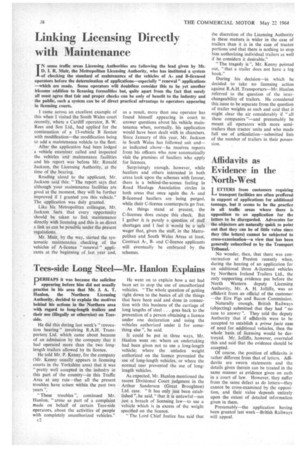Affidavits as Evidence in the North-West
Page 40

If you've noticed an error in this article please click here to report it so we can fix it.
ET'TERS from customers requiring transport facilities are often proffered in support of applications for additional tonnage, but it seems to be the practice in all traffic areas where there is opposition to an application for the letters to be disregarded. Advocates for the objectors are naturally quick to point out that they can be of little value since they (the letters) cannot be subjected to cross-examination--a view that has been generally subscribed to by the Transport Tribunal.
No wonder, then, that there was consternation at Preston recently when, during the hearing of an application for an additional three A-licensed vehicles by Northern Ireland Trailers Ltd., the only supporting evidence put before the North Western deputy Licensing Authority, Mr. A. H. Jolliffe, was an affidavit from an official of the customer —the Eire Pigs and Bacon Commission.
Naturally enough, British Railways (objecting) submitted that they had "no case to answer ". They told the deputy Authority that if affidavits were to be accepted to establish a prima facie case of need for additional vehicles, then the whole basis of licensing would be destroyed. Mr. Jolliffe, however, overruled this and said that the evidence should be accepted.
Of course, the position of affidavits is rather different from that of letters. Affidavits are sworn statements and the details given therein can be treated in the same manner as evidence given on oath in a court of law. However, they suffer from the same defect as do letters—they cannot be cross-examined by the opposition, and their value depends entirely upon the extent of detailed information given in them.
Presumably—the application having been granted last week—British Railways will appeal.




























































































































